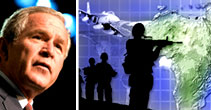Africa rebukes Bush on African Command
By Saeed ShabazzStaff Writer | Last updated: Jul 11, 2007 - 10:27:00 PM
What's your opinion on this article?

'The stand that many African countries has taken against the military command is one that needs to be supported; and needs to be explained to the U.S. public so, there is a greater understanding as to the implications of U.S. policy and why it is being rejected.' -Bill Fletcher Jr., TransAfrica Forum |
“We’ve got a big image problem down there,” The Guardian quoted a U.S. State Department official as saying. “Public opinion is really against getting into bed with the U.S. They just don’t trust U.S.,” the official said.
The president stated that the purpose of the command, known as Africom would be set to open by September 2008. Its purpose was to fight the war on terror and to provide humanitarian aid.
“The U.S. plan to set up its African Command has been unpleasant and out of sorts from the very beginning,” according to a March story in the People’s Daily Online. “An editorial carried by the Gabonese newspaper Reporter has appealed to African countries to say “no” to the U.S. African Command and not to partake in any activities for the construction of any U.S. military facility on the African continent,” the story said.
“The idea of an ‘Africa Military Command’ is a dangerous notion,” noted author, lecturer and former director of the TransAfrica Forum, Bill Fletcher Jr., to The Final Call. It started a couple of years ago in murmurings regarding the deployment of U.S. troops out of Europe into Africa, Mr. Fletcher said.
Until now, U.S. military involvement in Africa has been shared among the European, the Central Command and the Pacific Command. Secretary of Defense Robert Gates called this an “outdated arrangement left over from the Cold War,” according to USINFO (http://usinfo.state.gov).
The point man for the Pentagon is Ryan Henry, an undersecretary for policy at the Defense Department, who is saddled with the job of selling the Command to Africa. Mr. Henry, before embarking on his second trip to the continent, on June 21, told reporters that he was to explain to African leaders the broad outlines and goals of the command; and to seek their viewpoints. “Their inputs are invaluable to us as we start to make the decisions about the way ahead,” he said.
According to The Guardian, when Mr. Henry returned to Washington, he had “little to show from separate consultations with senior defense and foreign ministry officials in Algeria, Morocco, Libya, Egypt, Djibouti and with the African Union.
“The Libyan and Algerian governments reportedly told Mr. Henry that they would play no part in hosting Africom,” The Guardian reported, adding, “Even Morocco, considered Washington’s closest north African ally, indicated it did not welcome a permanent military presence on its soil.”
Analysts such as Mr. Fletcher say the real reason for Africom is to protect America’s oil interests in Africa. “The military command, in my opinion, is organized around the idea of securing strategical oil reserves, especially the Gulf of Guinea,” he said. “While there is much discussion about anti-terrorist activity, the reality—as I keep emphasizing—is that “terrorism” is not and has not been a major problem in Africa,” Mr. Fletcher insists.
“African countries are still concerned that the U.S. African Command could become a destabilizing factor in their countries instead of helping to uproot terrorism,” the People’s Daily Online stated.
However, there are African governments who say that Africom could be a positive factor on the continent.
Liberia’s president, Ellen Johnson Sirleaf, writing a guest editorial for allAfrica.com, on June 25 stated: “Liberians can only hope that the United States will use Africom to raise standards for engagement and help change the way of doing business in Africa. Africom is undeniably about the projection of American interests—but this does not mean that it is to the exclusion of African ones.”
“Africa is capable of solving its own problems,” stated the Sudan’s ambassador to the UN, Abdalmahmood Abdalhaleem. “Africa in the 21st century cannot be guided by others. We are mature enough to do it by ourselves,” he said.
“What the U.S. is saying to Africa is you need to rely on us because you are not militarily sophisticated,” offered Elombe Brath of the Harlem-based Patrice Lumumba Coalition. The war against terrorism is a phony issue, he said. “This whole idea is a contradiction to the principles of a united Africa,” Mr. Brath told The Final Call.
“The stand that many African countries has taken against the military command is one that needs to be supported; and needs to be explained to the U.S. public so, there is a greater understanding as to the implications of U.S. policy and why it is being rejected,” Mr. Fletcher opined.
Related news:
Bush Administration keeps the kerosene on the Somali flames (FCN, 07-10-2007)
Bush wants a military command in Africa (FCN, 03-29-2007)
Bush bombs Africa, no outcry! (FCN, 02-05-2007)
Bush's Goal: Bring African leaders in line with U.S. policy (FCN, 12-08-2006)
U.S. covets Africa's black gold (FCN, 10-01-2002)
How the U.S. Government destabilized foreign governments (FCN, 07-22-1985)
INSIDE STORIES AND REVIEWS
-
-
About Harriett ... and the Negro Hollywood Road Show
By Rabiah Muhammad, Guest Columnist » Full Story -
Skepticism greets Jay-Z, NFL talk of inspiring change
By Bryan 18X Crawford and Richard B. Muhammad The Final Call Newspaper @TheFinalCall » Full Story -
The painful problem of Black girls and suicide
By Charlene Muhammad -National Correspondent- » Full Story -
Exploitation of Innocence - Report: Perceptions, policies hurting Black girls
By Charlene Muhammad -National Correspondent- » Full Story -
Big Ballin: Big ideas fuel a father’s Big Baller Brand and brash business sense
By Bryan Crawford -Contributing Writer- » Full Story






 Click Here Stay Connected!
Click Here Stay Connected!








